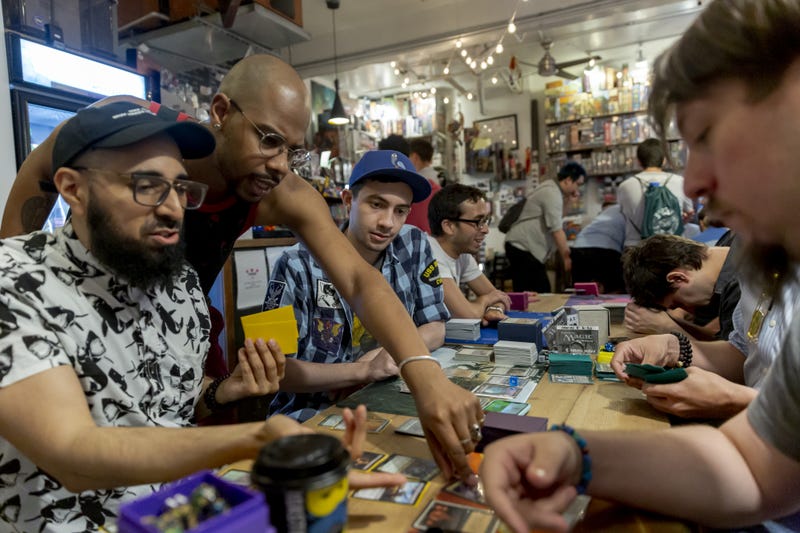
NEW YORK (1010 WINS) — Collectible trading card games (TCGs) are bigger than ever, but players are becoming increasingly alienated from the communities that once served as the driving force behind the games, as online shopping and the pandemic have battered the businesses that house local scenes.
With the density and size to support niche communities, New York City has become a bastion for die-hard fans and old-school players in a chaotic, high-stakes market where individual cards can sell for hundreds of thousands of dollars.
A “Black Lotus” Magic: The Gathering card sold for $511,100 at auction in January 2021. Celebrities like Logan Paul and Logic have dropped millions on cards.
With so much money on the line, investors who treat cards like stocks can get in the way of players who want to keep engaging with the hobby they love.
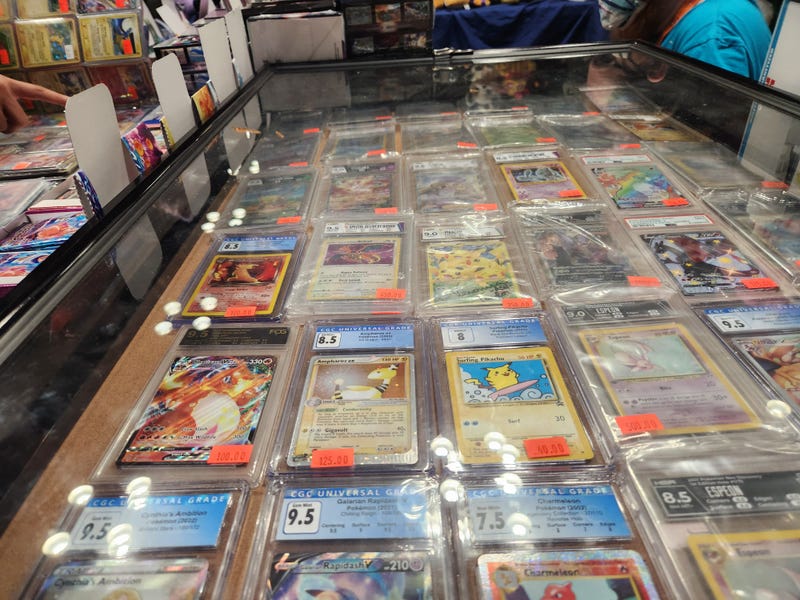
“The trading scene now is next to non-existent, vendors and things are buying up collections online, so the fun of going to a garage sale and randomly coming across cards or pre-eBay treasure hunting doesn’t really exist anymore,” Jae Breslow, a Magic fan who started playing in 1995, told 1010 WINS at New York Comic Con. “Everyone’s got something worth something, so going online you’re just going to find dealers selling cards and it’s not the same as players trading for play value.”
Breslow started playing during 4th Edition — the fourth set of Magic cards issued just two years after the Limited Edition Alpha set launched in 1993. He has a Black Lotus tattoo on his hand.
He’s nostalgic for his days playing in a market that was lower stakes than it is now.
“It’s almost like the stock market. Cardboard, instead of imaginary dollars,” he said. “I miss the game aspect of it.”
The internet has made TCGs more accessible than ever, but with that expanded player base has come rising prices, pressure on local game stores and new ways to scam players out of cash and cards.
“Trading online is iffy because of the quality of counterfeiting,” said Breslow. “Especially if you play the old stuff like I do. You have to be a lot more scrutinizing. You’re relying on the reputations of other people.”
E-commerce can be just as treacherous for sellers as buyers.
“Online is a weird monster,” said Chris Wyland, the owner of a card trading business called the Nerd Out that runs a circuit of conventions. “If you’re selling raw cards, you better have high grade definition scans of each one — back and front. And one out of five times someone’s going to try and get a refund by saying there’s damage on it that’s not there. So the only cards I sell on eBay are graded cards and slabs.”
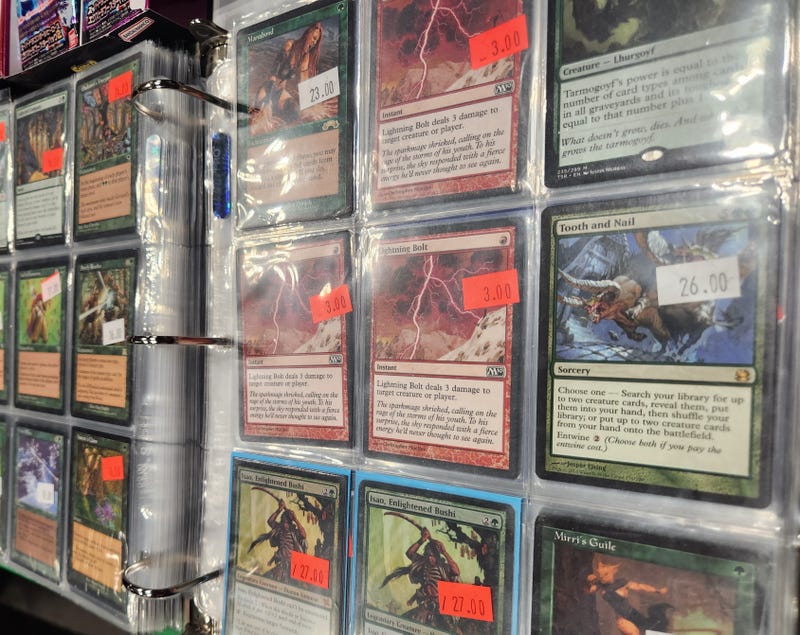
A graded card is one that Wyland has sent to a professional authenticator, which sent it back in a plastic slab marked with a serial number and a rating indicating its condition.
Wyland also records himself packaging each item to ensure no one can claim any wrongdoing on his part.
These are precautions Wyland learned to take the hard way, after buyers tried to cheat him out of money and merchandise.
EBay is aware that online shopping makes certain scams easier and has policies in place to mitigate risk.
“We have a lot of trust policies to protect people from scamming,” Bob Means, the director of trading cards at eBay, told 1010 WINS at New York Comic Con. “We have return policies that are built to help the sellers protect themselves. We have return policies to help buyers protect themselves. It’s critical for us to build trust policies on the site that work in the best interest of both sides.”
He emphasized that the vast majority of sales play out without a hitch.
“We transact millions of times a day, and 99.99999% of those things go perfectly well,” he said.
Means is speaking figuratively here. EBay did not provide 1010 WINS with official figures for the proportion of deals on the site that are tainted by fraud.
Perhaps more intractable than fraud is the problem of market manipulation.
Internet shopping hubs allow traders with enough money to buy up the entire stock of specific cards, artificially inflating the price — a classic pump-and-dump scheme.
“People were buying out things that were on a reserve list that will never be reprinted to inflate their value by pulling them off the market,” said Breslow. “That created a lot of chaos.”
Before sites like eBay, it was impossible to buy up so many copies of a certain card. Now that every major seller is online, the door is open for that kind of scheme.
The Securities and Exchange Commission regulates the stock market in an attempt to prevent market manipulation, but there’s no such body governing the TCG market.
EBay said it can’t speak to that kind of market manipulation and hasn’t considered the possibility of regulating the market.
The problems that fester in unregulated markets could become more acute as the demand for TCGs continues to expand.
An average of two collectible cards are sold every second on eBay, according to a spokesperson for the site.
EBay sales for Digimon cards are up 802% since last year and Weiss Schwarz cards are up 410%.
TCGs experienced a spike in interest during the early days of the pandemic, according to Means.
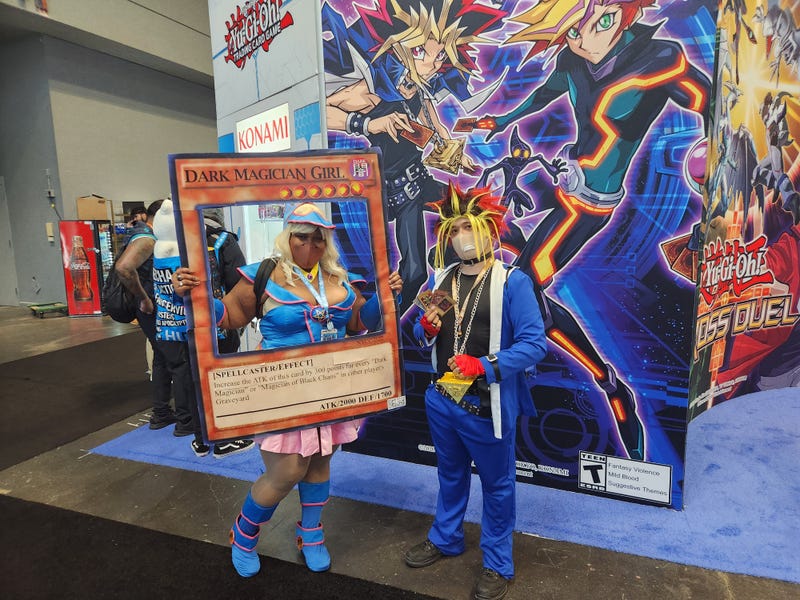
“A lot of people were staying at home, and they were digging into their closets or going into their basements or going up to the attic and digging through stuff,” he said. “There was this massive hunt and peck that started to occur, and I think people had some free time on their hands. Across collectible categories we saw people re-engage with comics, re-engage with cards, re-engage in gaming… Almost every single collectible category seemed to have a surge at that time.”
The growth wasn’t just due to buyers bored during lockdown looking for a new hobby. There was also a wave of players who had been shopping in person who were then forced online when stores closed — a TCG nerd internet diaspora.
Wyland was living the life of a real-world role playing game marchant — running a circuit of about 30 conventions a year and making a full-time living selling cards and other collectibles. All of the conventions stopped when COVID hit, and Wyland had to drive for DoorDash and Instacart to stay afloat.
He continued to trade on eBay for supplemental income, but it didn’t compare to his in-person route.
“We had 15 months with no conventions,” said Wyland. “So I sold stuff on eBay and drove around for companies I hate.”
Many in-person sellers relied on eBay during the pandemic. E-commerce became a lifeline as game stores were forced to shut down.
“Everything moved online. We couldn’t do New York Comic Con, we couldn’t do the National, which is the big sports card trade show. All of the shows shut down,” said Means. “On top of that, a lot of the brick-and-mortars didn’t have people coming into them, so e-comm was incredibly important and eBay was a huge part of this. I think we literally helped keep a lot of these hobbies afloat at that time.”
Breslow said he saw an influx of scams to match the surge in interest during the early days of the pandemic, as swindlers looked to capitalize on new players without the know-how to protect themselves.
“Especially with value skyrocketing over the pandemic, a lot of things got counterfeited or scammed,” said Breslow. “People sending cards, not getting things in return. There was something to be said about knowing what you were getting, first off, and then not getting price gouged because you’re forced to play with the dealers who are picking up these cards and trading for higher prices without actually meeting these people.”
While the collectible trading market underwent huge growth on eBay, brick-and-mortar stores were shutting down.
Kevin An opened Gamestoria, an Astoria game store, in February 2019. In March 2020, he closed shop like every other non-essential business in the city.
Since reopening, An has tried to cater to a larger audience to stay afloat, but the store has kept up its role as a home for the hobbyists who frequent its MTG events, tabletop RPG sessions and board game nights.
“They were always places to go, to do things, not just places to shop — game stores,” An told 1010 WINS. “The idea of a game store is evolving. One of my goals with having a game store is trying to also have a type of a third space.”
A third place is a sociological concept of a space that is neither a home (the first place) or work (the second place), but rather a commons where people can socialize and form relationships.
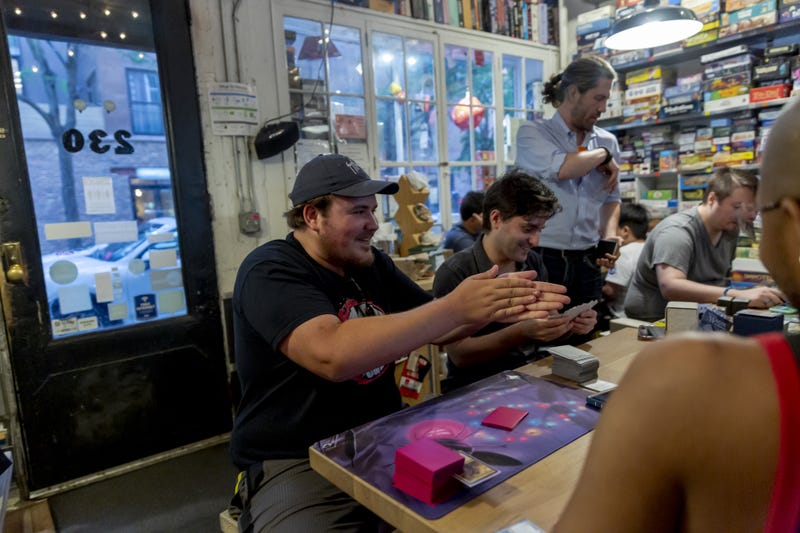
The internet has eaten away at third places. Whereas in the past one might have met their partner at a bar (a classic example of a third place), now a dating app plays that role.
Likewise, the conglomeration of businesses has further destroyed third places.
A neighborhood cafe can serve as a commons — a place to meet neighbors, escape workplace tedium and relax without isolation. That’s lost when replaced with a Starbucks — a fast food restaurant designed to get customers in and out as quickly as possible.
COVID-19 accelerated the destruction of third places brought about by the internet and corporate expansion.
Restaurants, theaters, churches, parks, bookstores and more all closed in the early days of the pandemic. Many never reopened.
Game stores were hurt by these factors as well. With the rise of online shopping, it’s more convenient for hobbyists to get their collectibles or tools online.
Still, many TCG fans are eager to support their local game shops — recognizing their function as third places.
“I’d much rather go to the local game stores now that they're open — even if I’m wearing a mask — so I can actually play,” said Breslow. “I’m not in it for the business aspect, much to my wallet’s chagrin. I’m a player. To be able to actually play, see people face to face — the social aspect was one of the reasons I got into it in the first place.”
E-commerce is an attractive alternative to in-person shopping.
Sites like eBay have made TCGs more accessible than ever.
“From a buyer’s perspective, we open up inventory to everybody,” said Means. “So, back in my day, when I was collecting my comic books, I had access to marvel and DC, and that was all we had. Some of the other brands that were coming out at the time like Image, back then they were hard to get because my comic book store didn’t handle them. And eBay was like a nascent technology that I didn’t know about. But eBay then enabled someone who lived in a small town like I did. You could now get on the internet. You could find that stuff that you couldn’t get at a local store.”
Online shopping has also set easily accessible, standardized prices that in some ways make consumers safer when buying cards.
Before the internet, players and stores used print guides for pricing.
“The prices would be all over the place,” said An. “With the advent of things like TCGPlayer [an online marketplace for trading cards], it’s a lot easier for people to gauge the value of cards they're trying to buy... Ultimately I think that’s a very healthy thing, because it gives everyone the same information.”
Despite the benefits of buying and selling cards online, TCG scenes can’t survive without a physical presence.
Just as Zoom happy hours are a sorry replacement for a night at the bar or messaging a Tinder match is no substitute for a first date, the internet can’t simulate participation in a localized TCG scene.
EBay recognizes this, and Means hopes eBay can support the brick-and-mortar stores that house the most passionate TCG players.
“We help bring the world to sellers,” he said. “It’s getting harder and harder to run a business without an e-comm presence, so we bring the world’s eyes to our seller. In many ways we help keep that brick-and-mortar thing afloat, which we think is cool. We don’t want these centers of culture, and that’s the way we think about them trading card stores, comic book stores, gaming stores, vinyl stores, those are critical to the greater ecosystem, so it's a piece of it that we help magnify that.”
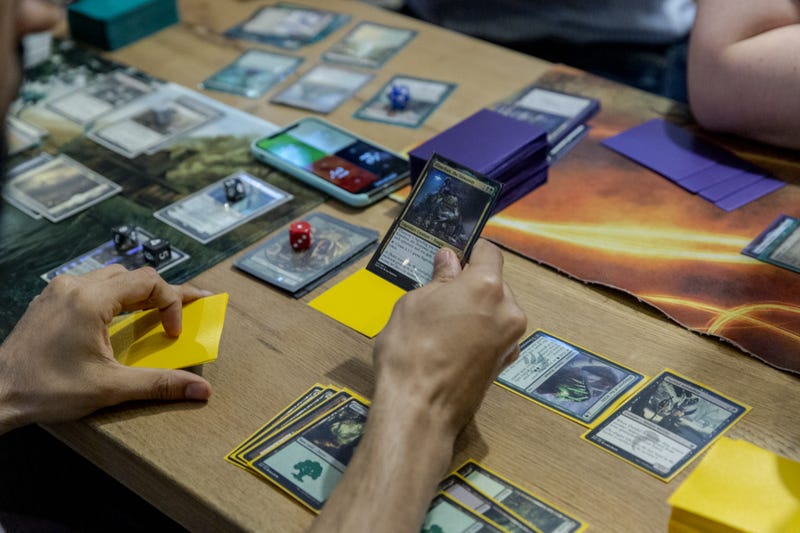
The company is also interested in supporting more direct community engagement in partnership with stores.
“We believe in the brick-and-mortar. And we recognize that we have helped keep brick-and-mortars up and running through COVID,” said Means. “I would love to personally figure out how to highlight who these brick and mortar stores are, so that you know you’re buying from a real comic book shop, because that gives you a greater sense of security as well.”
Some small towns and cities have lost their local TCG scenes in the chaos of the transition to online shopping and the crushing weight of the pandemic.
In New York City though, there’s no shortage of people like Breslow to sustain local game shops.
It’s players like him who keep businesses like An’s alive.
“Gamestoria in Astoria, New York is kind of like my home base right now,” he said. “The owner Kevin is a great dude. We play a lot of old school Magic, which is pretty much what I do, and then he also does the standard tournaments and drafts to get new players, old players, various tournament types, plus other games like DnD, board games — they’ve got a lot of board games. I love that place.”


